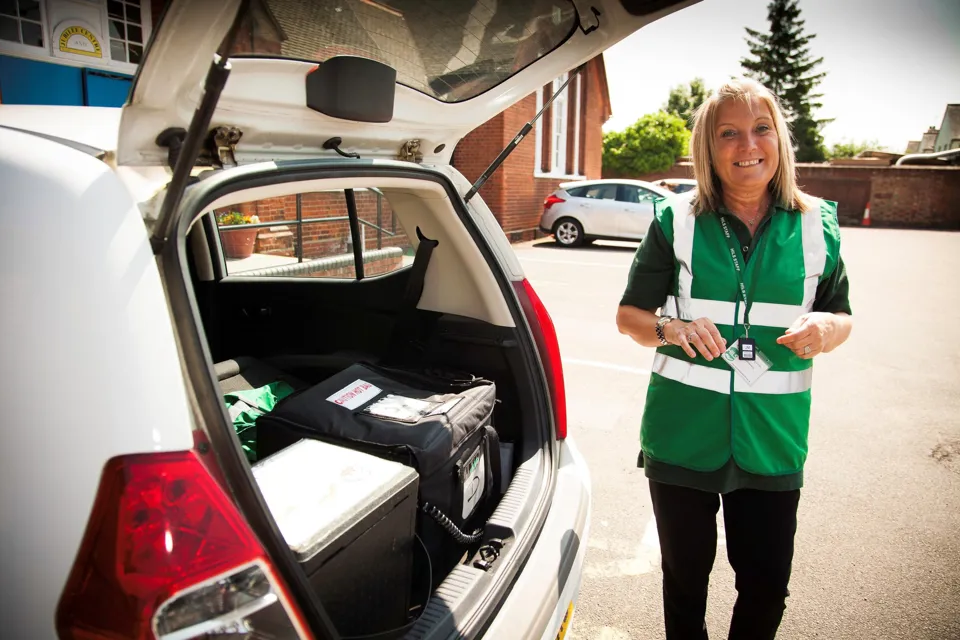Safe driving policies introduced by Hertfordshire Independent Living Service (HILS), which have triggered a 26% fleet insurance premium saving, have seen it become the newest organisation to join the Driving for Better Business campaign as a business champion.
The not-for-profit charitable social enterprise, which provides meals-on-wheels and caring support for thousands of elderly, frail or disabled people in Hertfordshire, operates a 68-strong car fleet.
Four years ago HILS started to equip its cars, operated on three-year hire purchase agreements, with telematics and despite a 50% increase in the size of its fleet in the past 18 months resulting in an increased exposure risk with more miles being driven, the organisation has seen:
- A 43% reduction in annual collision/damage incidents
- A positive behavioural change from drivers with in-vehicle telemetry devices recording a significant reduction in ‘speeding incidents’
- An improvement in drivers’ overall ‘safety scores’ as they react to a dashboard display that records unsafe manoeuvres linked to individual driving style. Drivers can view their scores via an online portal, compare them with colleagues to inspire better driving and managers can track scores and use them as a basis for performance management.
The drivers’ response to the fitment of GreenRoad’s telematics system has also delivered financial benefits to HILS, which has enabled the savings to further support and improve frontline services.
In addition to a 26.3% fleet insurance premium savings from 2015/16 to 2016/17, the benefits include:
- Reduced car damage as a result of fewer collision which has importantly cut vehicle downtime resulting in HILS providing an even more reliable service, while also boosting residual values at the end of hire purchase agreements
- More accurate arrival times being given to customers as managers can check the exact location of drivers via the telematics service and drivers can advise of any delays
- The introduction of daily vehicle maintenance checks by drivers supplemented by weekly checks by nominated members of staff have boosted the overall measurable standard of roadworthiness of cars and reduced breakdown risk
- An ability to track lone drivers while they are working on behalf of HILS.
HILS operates out of four sites across Hertfordshire - in Hemel Hempstead, Letchworth, St Albans and Ware - delivering approximately 500,000 meals, undertaking welfare checks and carrying out a range of other vital services annually that means seeing up to 2,000 people daily.
As part of HILS’s recruitment process driving licences are validated against the Driver and Vehicle Licensing Agency data base, while there is also a ban on mobile phone use when on the road.
Tom Cottam, head of business development at HILS, said: “We use high level management information from the telemetry system to engage further with drivers and continually develop our fleet safety strategy. HILS is in a continuous state of self-improvement.”
HILS is looking at introducing further pre-employment checks that focus on driver behaviour.
Cottam added: “In addition to monitoring performance through the telemetry data we can avoid employing potentially unsafe drivers in the first place.”
Further safety initiatives currently under consideration include a 'reverse-in' car parking space policy when drivers are on site visits.
Cottam said: ““We have invested time and money into developing our internal policies and procedures relating to the fleet and we are delighted that our pro-active attitude and results from the initiatives we have introduced are reflected in HILS achieving business champion status.
"We are proud to be an advocate for safer driving practices positively influencing all employers that want to improve and promote their fleet safety.”
Driving for Better Business champion programme manager Melvyn Hodgetts said: “We are keen to further accelerate the take-up of initiatives to reduce work-related road collisions by employers, particularly among organisations that operate small and medium-sized fleets.
“The safe-driving systems, policies and procedures introduced by HILS have clearly delivered cultural and behavioural change among drivers with clear benefits.
"Few employers operating fleets of this size recognise that the road risk facing their employees is equal to or greater than the occupational risk in the work they do.
“As a business champion, we will highlight the initiatives introduced by HILS and the resulting tangible benefits to influence other organisations to follow their lead.

















Login to comment
Comments
No comments have been made yet.